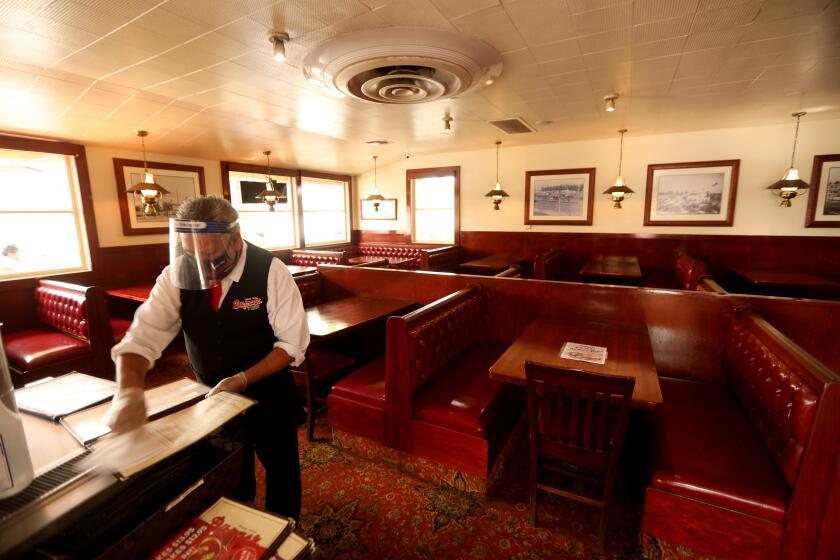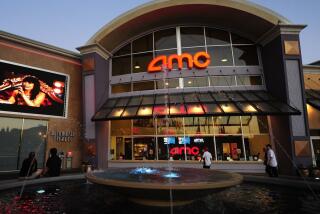Movie theaters tout COVID-19 safety. Will moviegoers buy it?
- Share via
After months of theater closures and no new big Hollywood movies, cinemas are finally starting to return to business in the U.S. But whether patrons come back will depend on one key question: Do they feel safe?
The major cinema chains made their best case Friday that the beleaguered exhibition industry is doing what it can to prevent the spread of COVID-19 as they desperately work to get back on their feet. The National Assn. of Theatre Owners (NATO), the trade group that represents cinemas, unveiled its new nationwide health and safety standards for sanitation, mask-wearing and other measures, which it has dubbed “CinemaSafe.”
The Washington-based lobbying organization said more than 300 companies, including about 2,600 individual theaters and 30,000 screens in the U.S., have signed on to the voluntary protocols ahead of the release of new movies such the Russell Crowe-starring “Unhinged” and Christopher Nolan’s “Tenet.”
As theater chains reopen across the country, “Unhinged,” “Words on Bathroom Walls” and “Cut Throat City” lead the first wave of new movies to open in theaters amid the pandemic.
The rules include mandatory masks for employees and customers, unless they’re actively eating or drinking in the auditorium. The theaters that signed on have also committed to enhanced cleaning measures and reduced capacity in auditoriums to encourage social distancing. The protocols also call on theaters to make sure their HVAC systems are all working properly, with increased ventilation “whenever possible.”
Most theater companies have already set out their own more detailed procedures for making sure people aren’t sitting too closely together while watching a movie, with online ticketing and blocked-out seats, for example. However, with distancing standards varying widely from state to state, the theaters are pushing hard the argument that moviegoing is safe more broadly, or at least as safe as going to a restaurant, flying on an airplane or worshiping in a church.
NATO made its pitch in an hourlong Zoom news conference that also included executives from AMC Theatres, Regal, Cinemark, Imax and Marcus Theatres, along with two health experts.
“It was super-clear that a nationwide program that brought the industry together ... was really the thing that consumers were looking for to say, ‘I feel safe, and I feel comfortable coming back to the cinema,’” Imax Entertainment President Megan Colligan said during the conference. “How we do this, and how we keep our customers safe, matters to literally everyone all over the world.”
Indeed, whether customers feel comfortable going back is an existential issue for theater owners, whose cinemas have been largely shut down since mid-March. AMC, which has remained closed throughout the bulk of the pandemic, lost $561 million in its most recent quarter as revenue dropped almost 100%. Leawood, Kan.-based exhibitor AMC, the world’s largest theater company, also restructured its debt to stay afloat.
Theaters have slowly started to open their doors, with about 1,500 locations open in the U.S. and Canada (about a quarter of the total) as of this weekend, according to Comscore.
But business has been slow due to a lack of new movies, and theaters have focused mainly on legacy titles including “Jaws” and “Jurassic Park.” In a quirk of the COVID era, 2001’s “Harry Potter and the Sorcerer’s Stone” this week crossed the $1-billion box office milestone because of its release in reopened Chinese theaters. “Unhinged” opens this weekend, followed by Disney’s “The New Mutants” (Aug. 28) and “Tenet” (Labor Day weekend).
It’s still not clear when theaters will be allowed to reopen in major markets such as Los Angeles and New York. A judge in New Jersey this week rejected NATO‘s bid for a preliminary injunction to allow theaters to reopen in the state. New York Gov. Andrew Cuomo hasn’t given a specific date for when movie houses can return. And California Gov. Gavin Newsom last month ordered indoor theaters to close again amid a rise in cases.
Gov. Gavin Newsom restricts indoor dining, tasting rooms, entertainment centers, movie theaters, zoos, museums and card rooms in California counties struggling to control the coronavirus.
Still, theaters are pushing ahead with marketing campaigns to get people back in their seats. AMC reopened some theaters with a one-day promotion offering 15-cent tickets on Thursday. Theaters chains such as Cinemark have released videos on social media showcasing cleaning measures. Austin, Texas-based Alamo Drafthouse says its chain will be “safer than a supermarket.”
In an interview this week, Mooky Greidinger, CEO of Regal’s British parent company Cineworld, said special expert teams have been visiting the company’s locations twice weekly to make sure safety measures are up to snuff.
“We put a lot of effort, first and foremost, into the safety issues because the priority to us is the safety of our customers and our team,” he said.
Still, he acknowledged that it could be a long time before the theatrical industry returns to full strength. Analysts don’t expect moviegoing to make a total recovery, at least until a coronavirus vaccine is widely available.
“There is no doubt we cannot perform at the numbers we used to have at this stage,” Greidinger said. “But safety is the priority.”
Questions remain about whether and how theaters will enforce mask-wearing policies during a two-hour-plus film such as “Tenet.”
AMC created a massive blow-back when it earlier announced it would only “strongly encourage” masks across its circuit, but quickly changed course when the company was hammered on social media. AMC has said about two-thirds of its 630 U.S. theaters will be open by the end of the month.
AMC Entertainment Chief Executive Adam Aron, during the Zoom conference, called masks “a subject near and dear to our heart,” adding that it would be “easy to enforce this policy, because this is what moviegoers want. We will not let them into our theaters if they’re not wearing masks, and we will not let them stay if they do not keep their masks on.”
Cinemas that commit to the protocols will be able to display a “CinemaSafe” badge on their websites and at their theater locations to promote their efforts, NATO said.
As theaters tout safety, studios are also launching marketing campaigns to help bring customers back to theaters for their new movies.
For Solstice Studios’ first offering, the R-rated road rage thriller “Unhinged,” Crowe made a video that at first appears to be a heartfelt PSA about the return of the cinema. But after some highfalutin remarks, Crowe makes a hard turn to a profane, confrontational rant pitching his movie about a homicidal maniac.
“They say there is a catalyst at the heart of the cinema experience,” Crowe wistfully intones in the video. “But who are they? Some conceited, pretentious ... who try to ... in your pocket and tell you it’s raining? ... I’ve got a movie coming out. It’s called ‘Unhinged.’”
Solstice Studios marketing head Vinny Bruzzese said figuring out how to sell the dark thriller “Unhinged” during a global health crisis wan’t easy.
“It’s not just about getting people aware and getting people excited about ‘Unhinged,’” he said. “It’s about getting people back into the habit of going to the movies, period.”
NATO said its protocols were designed based on the guidelines set out by the Centers for Disease Control and Prevention, World Health Organization, Occupational Safety and Health Administration and other health experts.
During the conference, Dr. Joyce Sanchez, an infectious disease specialist at the Medical College of Wisconsin, and Dr. David F. Goldsmith, an occupational and environmental epidemiologist at George Washington University, broadly supported the association’s assertion that its protocols would help mitigate the risk.
However, Sanchez cautioned that no public activities are without risk, and that she would encourage people to keep their popcorn and soda consumption to a minimum while in a theater. Patrons should take into account the trajectory of the virus in their local communities before venturing to their hometown multiplex, she added.
“This is not risk-free, and it’s important for the public to understand that,” Sanchez said.
More to Read
Inside the business of entertainment
The Wide Shot brings you news, analysis and insights on everything from streaming wars to production — and what it all means for the future.
You may occasionally receive promotional content from the Los Angeles Times.












